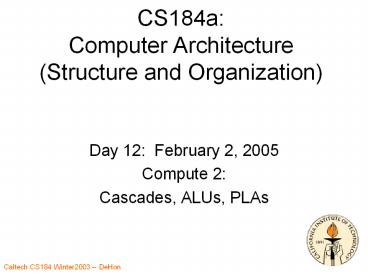CS184a: Computer Architecture (Structure and Organization) - PowerPoint PPT Presentation
Title:
CS184a: Computer Architecture (Structure and Organization)
Description:
... wired-OR Wired-or Connect series of inputs to wire Any of the inputs can drive the wire high Wired-or Implementation with ... of Technology Other titles: Times ... – PowerPoint PPT presentation
Number of Views:181
Avg rating:3.0/5.0
Title: CS184a: Computer Architecture (Structure and Organization)
1
CS184aComputer Architecture(Structure and
Organization)
- Day 12 February 2, 2005
- Compute 2
- Cascades, ALUs, PLAs
2
Last Time
- LUTs
- area
- structure
- big LUTs vs. small LUTs with interconnect
- design space
- optimization
3
Today
- Cascades
- ALUs
- PLAs
4
Last Time
- Larger LUTs
- Less interconnect delay
- General Larger compute blocks
- Minimize interconnect crossings
- Large LUTs
- Not efficient for typical logic structure
5
Different Structure
- How can we have larger compute nodes (less
general interconnect) without paying huge area
penalty of large LUTs?
6
Structure in subgraphs
- Small LUTs capture structure
- What structure does a small-LUT-mapped netlist
have?
7
Structure
- LUT sequences ubiquitous
8
Hardwired Logic Blocks
Single Output
9
Hardwired Logic Blocks
Two outputs
10
Delay Model
- Tcascade T(3LUT) T(mux)
- Dont pay
- General interconnect
- Full 4-LUT delay
11
Options
12
Chung Rose Study
Chung Rose, DAC 92
13
Cascade LUT Mappings
Chung Rose, DAC 92
14
ALU vs. Cascaded LUT?
15
Datapath Cascade
- ALU/LUT (datapath) Cascade
- Long serial path w/out general interconnect
- Pay only Tmux and nearest-neighbor interconnect
16
4-LUT Cascade ALU
17
ALU vs. LUT ?
- Compare/contrast
- ALU
- Only subset of ops available
- Denser coding for those ops
- Smaller
- but interconnect dominates
- Datapath width orthogonal to function
18
Parallel Prefix LUT Cascade?
- Can we do better than NTmux?
- Can we compute LUT cascade in O(log(N)) time?
- Can we compute mux cascade using parallel prefix?
- Can we make mux cascade associative?
19
Parallel Prefix Mux cascade
- How can mux transform S?mux-out?
- A0, B0 ? mux-out0
- A1, B1 ? mux-out1
- A0, B1 ? mux-outS
- A1, B0 ? mux-out/S
20
Parallel Prefix Mux cascade
- How can mux transform S?mux-out?
- A0, B0 ? mux-out0 Stop S
- A1, B1 ? mux-out1 Generate G
- A0, B1 ? mux-outS Buffer B
- A1, B0 ? mux-out/S Invert I
21
Parallel Prefix Mux cascade
- How can 2 muxes transform input?
- Can I compute 2-mux transforms from 1 mux
transforms?
22
Two-mux transforms
- SS?S
- SG?G
- SB?S
- SI?G
- GS?S
- GG?G
- GB?G
- GI?S
- BS?S
- BG?G
- BB?B
- BI?I
- IS?S
- IG?G
- IB?I
- II?B
23
Generalizing mux-cascade
- How can N muxes transform the input?
- Is mux transform composition associative?
24
Parallel Prefix Mux-cascade
Can be hardwired, no general interconnect
25
ALUs Unpacked
- Traditional/Datapath ALUs
- SIMD/Datapath Control
- Architecture variable w
- Long Cascade
- Typically also w, but can shorter/longer
- Amenable to parallel prefix implementation in
O(log(w)) time w/ O(w) space - Restricted function
- Reduces instruction bits
- Reduces expressiveness
26
Commercial Devices
27
Xilinx XC4000 CLB
28
Xilinx Virtex-II
29
(No Transcript)
30
(No Transcript)
31
(No Transcript)
32
Altera Stratix
33
(No Transcript)
34
(No Transcript)
35
Programmable Array Logic(PLAs)
36
PLA
- Directly implement flat (two-level) logic
- Oabcd !ab!d b!cd
- Exploit substrate properties allow wired-OR
37
Wired-or
- Connect series of inputs to wire
- Any of the inputs can drive the wire high
38
Wired-or
- Implementation with Transistors
39
Programmable Wired-or
- Use some memory function to programmable connect
(disconnect) wires to OR - Fuse
40
Programmable Wired-or
- Gate-memory model
41
Diagram Wired-or
42
Wired-or array
- Build into array
- Compute many different or functions from set of
inputs
43
Combined or-arrays to PLA
- Combine two or (nor) arrays to produce PLA
(and-or array)
Programmable Logic Array
44
PLA
- Can implement each and on single line in first
array - Can implement each or on single line in second
array
45
PLA
- Efficiency questions
- Each and/or is linear in total number of
potential inputs (not actual) - How many product terms between arrays?
46
PLA Product Terms
- Can be exponential in number of inputs
- E.g. n-input xor (parity function)
- When flatten to two-level logic, requires
exponential product terms - a!b!ab
- a!b!c!ab!c!a!bcabc
- and shows up in important functions
- Like addition
47
PLAs
- Fast Implementations for large ANDs or ORs
- Number of P-terms can be exponential in number of
input bits - most complicated functions
- not exponential for many functions
- Can use arrays of small PLAs
- to exploit structure
- like we saw arrays of small memories last time
48
PLAs vs. LUTs?
- Look at Inputs, Outputs, P-Terms
- minimum area (one study, see paper)
- K10, N12, M3
- A(PLA 10,12,3) comparable to 4-LUT?
- 80-130?
- 300 on ECC (structure LUT can exploit)
- Delay?
- Claim 40 fewer logic levels (4-LUT)
- (general interconnect crossings)
Kouloheris El Gamal/CICC92
49
PLA
50
PLA and Memory
51
PLA and PAL
PAL Programmable Array Logic
52
Conventional/Commercial FPGA
Altera 9K (from databook)
53
Conventional/Commercial FPGA
Altera 9K (from databook)
Like PAL
54
Big IdeasMSB Ideas
- Programmable Interconnect allows us to exploit
that structure - want to match to application structure
- Prog. interconnect delay expensive
- Hardwired Cascades
- key technique to reducing delay in programmables
- PLAs
- canonical two level structure
- hardwire portions to get Memories, PALs
55
Big IdeasMSB-1 Ideas
- Better structure match with hardwired LUT
cascades































